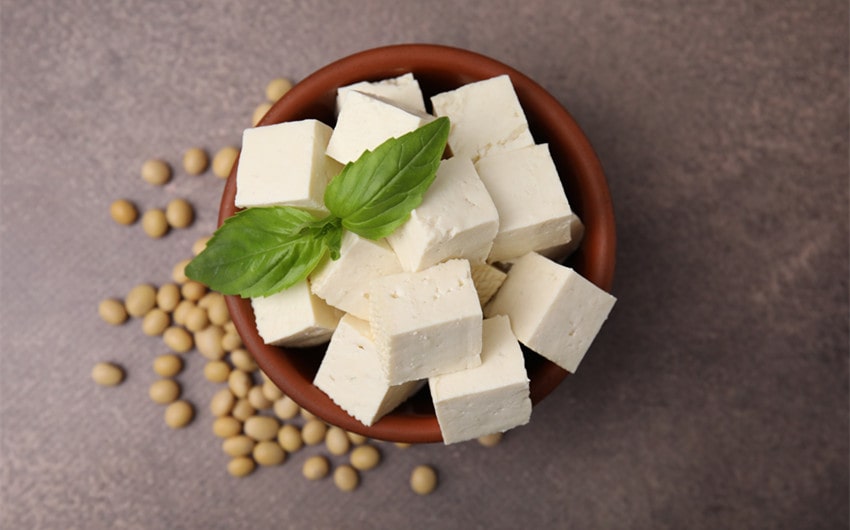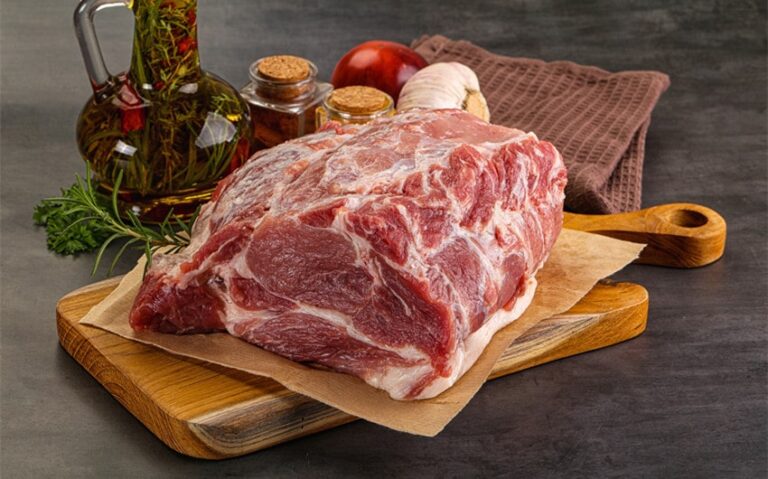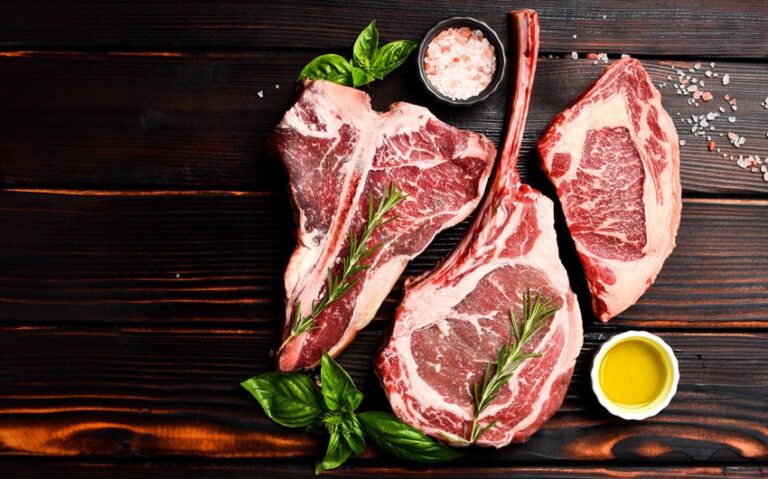Can You Eat Tofu When Pregnant? Uncover the Truth
When you’re expecting, every meal decision feels important, and you’re likely questioning which foods are safe to eat. If you’re a fan of tofu, you might be wondering, can you eat tofu when pregnant? Tofu is a popular plant-based protein that’s packed with nutrients, but is it a good choice during pregnancy?
Understanding what’s on your plate can help you make confident, healthy choices for you and your baby. Let’s explore whether tofu should stay on your menu during these crucial months.
Is Tofu Safe During Pregnancy?

Tofu is widely regarded as a safe and nutritious food choice during pregnancy when consumed in appropriate amounts. This plant-based protein offers significant health benefits, including being a rich source of protein, calcium, and iron—nutrients that are vital for both maternal health and fetal development. However, there are some scientific considerations to keep in mind to ensure that tofu remains a beneficial part of your diet during pregnancy.
1. Soy Allergies
One of the primary concerns with tofu is the potential for soy allergies. Tofu is derived from soybeans, which are one of the top eight allergens in the United States. For those with a soy allergy, consuming tofu can trigger allergic reactions that range from mild symptoms, such as hives or digestive discomfort, to severe reactions like anaphylaxis. If you have a known soy allergy, tofu should be avoided entirely during pregnancy, just as it would be outside of pregnancy.
2. Phytoestrogens in Soy
Tofu contains phytoestrogens, specifically isoflavones, which are plant compounds that can mimic estrogen in the body. There has been concern about whether these phytoestrogens could interfere with hormonal balance during pregnancy.
However, scientific research has shown that the phytoestrogens in soy products like tofu are much weaker than human estrogen and do not appear to have harmful effects when consumed in moderation. Large-scale studies have found no significant association between moderate soy intake and adverse pregnancy outcomes, suggesting that tofu can be safely included in a balanced pregnancy diet.
3. Thyroid Health
Tofu, like other soy products, contains goitrogens—substances that can interfere with iodine uptake and thyroid function. Thyroid hormones are crucial during pregnancy, as they regulate the development of the baby’s brain and nervous system. In regions where iodine deficiency is common, high consumption of goitrogens could potentially exacerbate thyroid issues.
However, in iodine-sufficient populations, moderate tofu consumption has not been shown to cause thyroid dysfunction. Pregnant women should ensure they have adequate iodine intake, which can help mitigate any potential impact of goitrogens from tofu.
4. Source and Preparation
The safety of tofu during pregnancy also hinges on how it is sourced and prepared. Choosing organic, non-GMO tofu can reduce exposure to pesticides and genetically modified organisms, ensuring a purer food source. Additionally, proper handling and cooking are essential to prevent foodborne illnesses such as listeriosis, which can have serious consequences during pregnancy.
Nutritional Benefits of Tofu
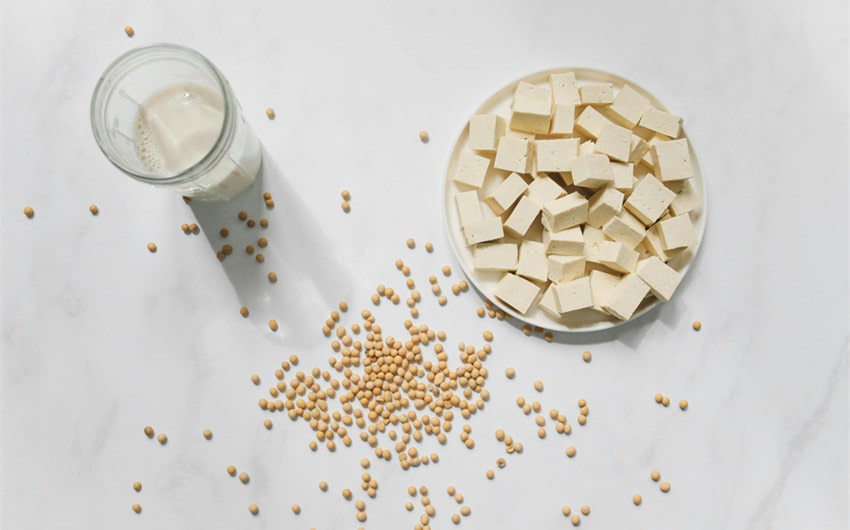
Tofu is often celebrated as a versatile and nutrient-dense food, making it an excellent option during pregnancy. Understanding the specific nutritional benefits of tofu can help you appreciate its value in a pregnancy diet. Below, we explore the key nutrients found in tofu and how they contribute to both maternal and fetal health.
1. High-Quality Protein
Protein is a fundamental building block for the body, playing a crucial role in the development of fetal tissues, including the brain, muscles, and organs. During pregnancy, your protein needs increase significantly to support both your own health and your baby’s growth.
Tofu is an excellent source of plant-based protein, offering about 8 grams of protein per 100 grams serving. What makes tofu particularly valuable is that it provides all nine essential amino acids, making it a complete protein. This is especially important for vegetarians and vegans, who may rely on tofu as a primary protein source during pregnancy.
2. Rich in Calcium
Calcium is vital during pregnancy for the development of your baby’s bones and teeth. It also supports the proper functioning of the muscular, circulatory, and nervous systems. Pregnant women are advised to consume about 1,000 mg of calcium per day.
Tofu, particularly when made with calcium sulfate, can be a significant contributor to this daily requirement. A 100-gram serving of tofu can provide anywhere from 10% to 20% of your daily calcium needs, depending on how it’s prepared. Including tofu in your diet helps ensure that both you and your baby have sufficient calcium for healthy development.
3. Good Source of Iron
Iron is another critical nutrient during pregnancy, as it supports the increased blood volume needed to supply oxygen to your baby. Pregnant women are often at risk of iron deficiency anemia, which can lead to fatigue, weakness, and complications such as preterm delivery or low birth weight.
Tofu offers a good plant-based source of iron, with about 5.4 mg per 100 grams serving, which contributes to your daily iron needs. Pairing tofu with vitamin C-rich foods, such as bell peppers or citrus fruits, can enhance iron absorption, making it an even more effective way to boost your iron intake.
4. Low in Calories and Fat
Maintaining a healthy weight during pregnancy is important for both maternal and fetal health. Tofu is naturally low in calories and fat, particularly when compared to animal-based protein sources. A 100-gram serving of tofu contains only about 70-80 calories and 4-5 grams of fat, most of which are heart-healthy unsaturated fats.
This makes tofu a satisfying option that can help you meet your protein needs without excessive calorie intake, supporting healthy weight management during pregnancy.
5. Source of Omega-3 Fatty Acids
Omega-3 fatty acids are essential for the development of your baby’s brain and eyes. While fish is a well-known source of omega-3s, tofu also contains alpha-linolenic acid (ALA), a type of omega-3 fatty acid found in plant foods.
While ALA must be converted in the body to the more active forms (EPA and DHA), it still contributes to your overall omega-3 intake. Including tofu as part of a varied diet can help ensure you’re getting a range of healthy fats, which are crucial for your baby’s development.
6. Rich in Isoflavones
Tofu is a significant source of isoflavones, a type of phytoestrogen that has antioxidant properties. During pregnancy, oxidative stress can be a concern, as it’s linked to complications such as preeclampsia and gestational diabetes.
The isoflavones in tofu may help combat oxidative stress, contributing to a healthier pregnancy. While more research is needed to fully understand the impact of isoflavones during pregnancy, they are considered beneficial in moderate amounts as part of a balanced diet.
7. Provides Other Essential Nutrients
In addition to protein, calcium, and iron, tofu also provides a range of other essential nutrients that support a healthy pregnancy. These include magnesium, which aids in muscle function and bone development; zinc, important for immune function and cell growth; and folate, which is crucial for preventing neural tube defects. Tofu is also a good source of vitamin B1 (thiamine) and phosphorus, both of which play key roles in energy metabolism and bone health.
How to Safely Include Tofu in Your Pregnancy Diet
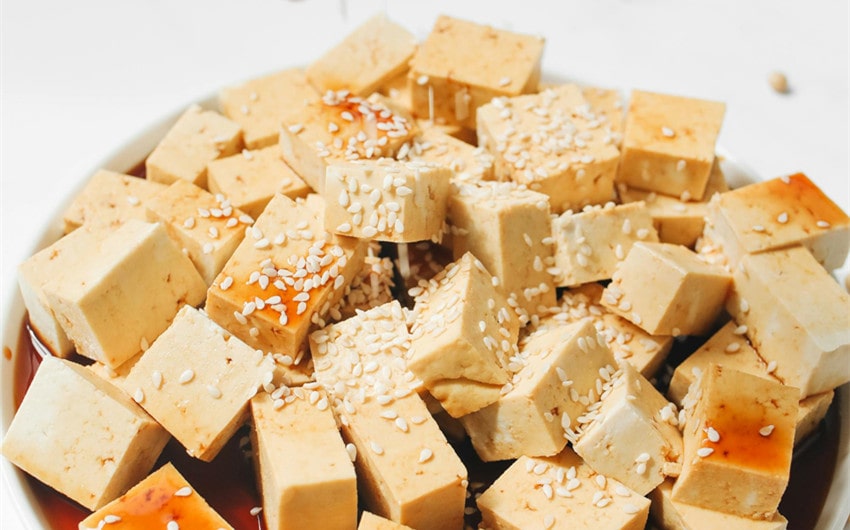
Ensuring that tofu is properly selected, prepared, and consumed in moderation can help you enjoy its benefits without risking your health or that of your baby. Below are some detailed guidelines on how to safely include tofu in your pregnancy diet.
1. Choosing the Right Tofu
Tofu comes in various textures and forms, from silken to extra-firm, and can be found in most grocery stores. When selecting tofu, it’s important to choose high-quality, fresh products:
- Opt for Organic and Non-GMO Tofu: Organic tofu is made from soybeans that are grown without synthetic pesticides and fertilizers. Choosing organic also ensures that the tofu is made from non-GMO soybeans, which can be a consideration for those who prefer to avoid genetically modified foods during pregnancy.
- Check Expiration Dates: Always check the expiration date on the package to ensure freshness. Tofu that is close to or past its expiration date may not be as safe or nutritious.
- Consider Calcium-Set Tofu: Some tofu is set using calcium sulfate, which increases its calcium content. This can be particularly beneficial during pregnancy, as calcium is essential for fetal bone development. Look for labels that indicate the tofu is “calcium-set” if you want to boost your calcium intake.
2. Proper Storage
Proper storage of tofu is crucial to prevent spoilage and reduce the risk of foodborne illness:
- Refrigeration: Tofu should be stored in the refrigerator at all times. Once opened, tofu should be kept in a container with water, and the water should be changed daily to maintain freshness. Consume opened tofu within 3-4 days to ensure it remains safe to eat.
- Freezing: If you don’t plan to use the tofu immediately, you can freeze it for up to 3 months. Freezing tofu changes its texture, making it chewier and more porous, which some people prefer for certain dishes. Thaw frozen tofu in the refrigerator before cooking.
3. Safe Preparation Techniques
Cooking tofu thoroughly is essential to reduce the risk of foodborne illness, which can be particularly dangerous during pregnancy:
- Avoid Raw Tofu: While some people enjoy raw tofu in dishes like salads or smoothies, it’s safer to cook tofu during pregnancy. Cooking tofu to an internal temperature of at least 165°F (74°C) will kill any harmful bacteria that may be present.
- Cooking Methods: There are many ways to cook tofu, including baking, frying, steaming, and grilling. For a healthy pregnancy diet, consider baking or steaming tofu rather than frying it, as these methods use less oil and retain more nutrients. Marinating tofu before cooking can add flavor and enhance its nutritional profile, especially if you use ingredients like lemon juice or garlic.
- Incorporating Tofu into Meals: Tofu is incredibly versatile and can be added to a variety of dishes. Consider adding tofu to stir-fries, soups, salads, or casseroles. It can also be blended into smoothies or used as a substitute for meat in many recipes. Just be sure to pair tofu with other nutrient-rich foods, such as vegetables, whole grains, and healthy fats, to create balanced and satisfying meals.
4. Moderation is Key
While tofu is nutritious, it’s important to consume it in moderation during pregnancy:
- Balanced Diet: Aim to include a variety of protein sources in your diet, such as lean meats, fish, eggs, dairy products, legumes, and nuts, in addition to tofu. This ensures that you get a wide range of nutrients necessary for a healthy pregnancy.
- Serving Sizes: A typical serving of tofu is about 3.5 ounces (100 grams), which provides a good amount of protein, calcium, and other essential nutrients. You can safely include this serving size in your meals a few times a week, but it’s advisable not to rely solely on tofu as your primary protein source.
5. Pairing Tofu with Nutrient-Boosting Ingredients
Tofu can be even more beneficial when paired with other nutrient-rich foods that enhance its absorption and nutritional value:
- Vitamin C for Iron Absorption: The iron in tofu is non-heme iron, which is less easily absorbed by the body compared to heme iron found in animal products. Pairing tofu with foods rich in vitamin C, such as bell peppers, oranges, or strawberries, can significantly enhance iron absorption, helping to prevent anemia during pregnancy.
- Healthy Fats for Omega-3s: Adding healthy fats like avocado, olive oil, or nuts to tofu dishes can help you absorb fat-soluble vitamins and provide additional omega-3 fatty acids, which are important for your baby’s brain and eye development.
6. Consulting Your Healthcare Provider
Finally, it’s always a good idea to discuss your dietary choices with your healthcare provider, especially during pregnancy:
- Personalized Advice: Every pregnancy is different, and your healthcare provider can offer personalized advice based on your specific health needs, dietary preferences, and any potential concerns about tofu consumption.
- Monitoring Thyroid Health: If you have a thyroid condition or are concerned about the potential effects of goitrogens in tofu, your healthcare provider can monitor your thyroid function and suggest dietary adjustments if necessary.
Alternatives to Tofu

Whether you’re looking for variety, concerned about potential risks associated with tofu, or simply want to explore different flavors and textures, these alternatives can provide similar benefits. Here’s a closer look at some of the best tofu alternatives for pregnant women:
1. Tempeh
Tempeh is another soy-based product, but it differs from tofu in texture, flavor, and nutritional profile. Made from fermented soybeans, tempeh is firmer and has a more pronounced, nutty flavor compared to tofu. The fermentation process also makes tempeh more digestible and may enhance nutrient absorption.
- Protein and Nutrients: Tempeh is a rich source of protein, offering about 15-20 grams per 100-gram serving, making it even higher in protein than tofu. It also contains fiber, iron, calcium, and probiotics, which can support digestive health.
- Preparation: Tempeh can be steamed, grilled, or sautéed, and it works well in stir-fries, sandwiches, and salads. Its firm texture makes it a great substitute for meat in various dishes.
2. Edamame
Edamame, or young green soybeans, are another excellent source of plant-based protein. These whole soybeans are minimally processed, retaining their natural flavor and nutrients.
- Nutritional Benefits: Edamame is rich in protein, fiber, folate, and vitamin K. Folate is particularly important during pregnancy, as it helps prevent neural tube defects in the developing fetus.
- How to Enjoy: Edamame can be enjoyed as a snack, added to salads, or mixed into grain bowls. Simply steam or boil the beans and sprinkle them with a little sea salt for a delicious and nutritious treat.
3. Lentils
Lentils are a fantastic non-soy alternative to tofu, offering a high protein content along with a variety of essential nutrients. They come in various colors, including green, brown, red, and black, each with its own unique flavor and cooking time.
- Nutritional Profile: Lentils are packed with protein, iron, and folate, making them an excellent choice during pregnancy. They are also high in fiber, which can help prevent constipation—a common issue during pregnancy.
- Versatility: Lentils can be used in soups, stews, salads, and casseroles. They can also be pureed into dips or spreads, providing a versatile and hearty option for your meals.
4. Chickpeas
Chickpeas, also known as garbanzo beans, are a staple in many plant-based diets and a great alternative to tofu. They are incredibly versatile and can be used in a wide range of dishes.
- Nutritional Benefits: Chickpeas are a good source of protein, fiber, iron, and folate. They also contain magnesium, which supports muscle function and nerve health during pregnancy.
- Cooking Ideas: Chickpeas can be roasted for a crunchy snack, blended into hummus, added to salads, or used in curries and stews. They are also a key ingredient in many vegetarian dishes, such as falafel and veggie burgers.
5. Quinoa
Quinoa is a gluten-free grain that is often referred to as a “superfood” due to its high nutrient content. Unlike most plant-based foods, quinoa is a complete protein, containing all nine essential amino acids.
- Nutritional Highlights: In addition to being a complete protein, quinoa is rich in fiber, iron, magnesium, and phosphorus. It also contains antioxidants, which can help reduce inflammation and support overall health during pregnancy.
- Incorporating Quinoa: Quinoa can be used as a base for salads, added to soups, or served as a side dish. It can also be used as a substitute for rice or pasta in many recipes, offering a nutrient-packed alternative.
6. Seitan
Seitan, also known as wheat gluten, is a popular meat substitute made from gluten, the main protein in wheat. It has a chewy texture that closely resembles meat, making it a favorite among vegetarians and vegans.
- Protein Powerhouse: Seitan is one of the highest plant-based protein sources, with about 25 grams of protein per 100 grams. However, because it’s made from gluten, it’s not suitable for those with gluten sensitivity or celiac disease.
- Cooking Uses: Seitan can be grilled, sautéed, or simmered in sauces. It works well in dishes that typically use meat, such as stir-fries, sandwiches, and stews.
7. Nuts and Seeds
Nuts and seeds are nutrient-dense foods that can provide a good source of plant-based protein, healthy fats, and essential vitamins and minerals. They are easy to incorporate into your diet as snacks or as additions to various dishes.
- Nutritional Benefits: Nuts like almonds, walnuts, and cashews, as well as seeds like chia, flax, and pumpkin seeds, are rich in protein, healthy omega-3 fatty acids, and antioxidants. These nutrients are crucial for fetal brain development and overall health during pregnancy.
- Versatile Options: Nuts and seeds can be eaten on their own, added to oatmeal or yogurt, blended into smoothies, or used as toppings for salads and baked goods. Nut butters are another convenient way to include these nutrient powerhouses in your diet.
8. Black Beans
Black beans are a staple in many cuisines and offer a hearty, protein-rich alternative to tofu. They are particularly known for their rich flavor and versatility in various dishes.
- Nutritional Content: Black beans are high in protein, fiber, iron, and folate, making them an excellent choice for supporting pregnancy health. They are also a good source of potassium, which helps regulate blood pressure.
- Culinary Uses: Black beans can be used in soups, stews, salads, and tacos. They are also commonly used in vegetarian versions of chili and burritos, providing a filling and nutritious option.

